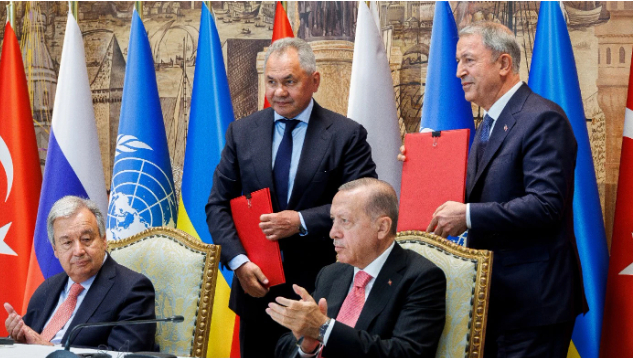May 30, 2025 | 03:00 GMT +7
May 30, 2025 | 03:00 GMT +7
Hotline: 0913.378.918
May 30, 2025 | 03:00 GMT +7
Hotline: 0913.378.918

In this handout photo released by Russian Defense Ministry Press Service, Turkish President Recep Tayyip Erdogan, right, and U.N. Secretary General, Antonio Guterres, sit as Russian Defense Minister Sergei Shoigu, top left, and Turkish Defense Minister Hulusi Akar, top right, exchange documents during a signing ceremony at Dolmabahce Palace in Istanbul, Turkey, Friday, July 22, 2022. Photo: Vadim Savitsky, Russian Defense Ministry Press Service via AP
A shipment of 20,000 metric tons of Russian-produced fertilizer was sent from the Netherlands to Malawi as part of a United Nations-brokered deal to keep agricultural commodities flowing to global markets despite an ongoing war between Russia and Ukraine, United Nations (U.N.) officials said Tuesday.
The shipment is part of a donation of more than a quarter-million metric tons of fertilizer stored in European ports from Russia, which is one of the world’s biggest producers of nitrogen-based fertilizers.
The U.N. said the donation “will serve to alleviate humanitarian needs and prevent catastrophic crop loss in Africa, where it is currently planting season.”
The agricultural fallout from the war in Ukraine has been a top concern for international economists and humanitarian groups monitoring exports of key commodities such as grain to vulnerable markets in the Middle East and North Africa.
“Governments should ensure that the conflict in Ukraine does not worsen the food crisis in the Middle East and North Africa and protect the right to affordable, adequate food for everyone,” humanitarian group Human Rights Watch said in a statement earlier this year.
The fertilizer initiative is part of an agreement signed in Istanbul in July to address global food insecurity.
Russia briefly pulled out of the agreement in October following an alleged attack on Russian ships supporting an export corridor from a Ukrainian port on the Black Sea. This caused a short spike in international grain prices before Russia resumed its participation in the deal.
The fertilizer shipment is “part of facilitation of trade,” Stéphane Dujarric, spokesman for the U.N.’s secretary-general, said during a press briefing on Tuesday.
“Producers of this fertilizer, which was already in European ports, have decided to give the fertilizers. Whether it’s paid or a gift, it remains trade,” he said.
International economists had been paying close attention to Russian fertilizer exports, which are crucially important to crop yields in a variety of agricultural sectors in numerous countries.
“If the fertilizers don’t flow, then the world will produce less,” U.N. Food and Agriculture Organization chief economist Máximo Torero said in an interview in June.
Lowered levels of food production can result in problems not just of food access but of general food availability, Torero said.
“That’s what worries us, that’s for us the most dramatic scenario and that’s what we need to avoid,” he said.
U.S. officials have also stressed the importance of Russian fertilizers to world markets.
“Fertilizer has, as you know, has become a huge problem, and Russia is a large fertilizer exporter,” U.S. Ambassador to the U.N. Linda Thomas-Greenfield told the BBC in May. “They just need to open up their own markets and end this war, end the blockade that they are responsible for and allow food to flow.”
U.N. officials in Istanbul reported Tuesday that the Black Sea grain corridor is continuing to operate, with three vessels leaving Ukrainian ports carrying more than 60,000 metric tons of wheat, corn and sunflower oil.
Despite the cooperation on agriculture, the fighting between Russia and Ukraine, which is supported by the West, is showing few signs of thawing.
“We have all seen Russia’s efforts to destroy Ukraine’s civilian infrastructure using missiles and Iranian drones,” White House spokeswoman Karine Jean-Pierre said on Tuesday. “Russia is depriving the Ukrainian people of heat, power and other critical services as winter approaches.”
(The Hill)

(VAN) Vikas Rambal has quietly built a $5 billion business empire in manufacturing, property and solar, and catapulted onto the Rich List.

(VAN) Available cropland now at less than five percent, according to latest geospatial assessment from FAO and UNOSAT.

(VAN) Alt Carbon has raised $12 million in a seed round as it plans to scale its carbon dioxide removal work in the South Asian nation.

(VAN) Attempts to bring down the price of the Japanese staple have had little effect amid a cost-of-living crisis.

(VAN) Fourth most important food crop in peril as Latin America and Caribbean suffer from slow-onset climate disaster.

(VAN) Shifting market dynamics and the noise around new legislation has propelled Trouw Nutrition’s research around early life nutrition in poultry. Today, it continues to be a key area of research.

(VAN) India is concerned about its food security and the livelihoods of its farmers if more US food imports are allowed.